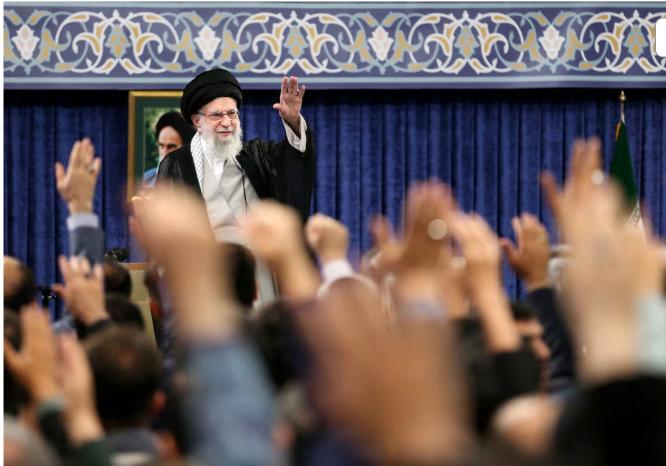Khamenei dismisses US claims on Iran nuclear strike success

Iran’s top leader, who had not been seen in public since open conflict with Israel erupted on June 13, delivered the televised address on Thursday morning from an undisclosed location.
Iran’s supreme leader has dismissed US claims that recent airstrikes on the country’s nuclear sites delivered a major setback to its atomic programme, insisting that Washington “gained no achievements” and warning of more retaliatory attacks if provoked again.
In his first public appearance since the ceasefire between Iran and Israel was announced on Tuesday, Ayatollah Ali Khamenei said the strikes “did not accomplish anything” in disrupting Iran’s nuclear progress.
Instead, he praised the counterattack on a US military base in Qatar as having dealt “a heavy blow”.
Khamenei declared that the American-led operation had failed to meet its objectives.
“They couldn’t accomplish anything and did not achieve their objective,” he said. He accused former US President Donald Trump of “exaggerating” the damage caused, adding: “This incident is also repeatable in the future, and should any attack take place, the cost for the enemy and the aggressor will undoubtedly be very high.”
Iran’s top leader, who had not been seen in public since open conflict with Israel erupted on June 13, delivered the televised address on Thursday morning from an undisclosed location.
Officials had earlier said he was in a secure site. His absence had sparked speculation over his whereabouts.
The remarks came in response to US Defence Secretary Pete Hegseth’s statement during a press conference at the Pentagon, where he insisted that joint strikes with Israel had “significantly damaged the nuclear programme, setting it back by years”.
Appearing alongside senior general Dan Caine, Hegseth described the operation as a “historic success” and said it had “rendered [Iranian] enrichment facilities inoperable”.
He also told reporters that intelligence had not shown any movement of enriched uranium out of Fordo – one of the sites targeted with powerful bunker-buster bombs.
Hegseth added, “We are not aware of any intelligence which indicated the enriched uranium had moved out of Fordo prior to the strikes.”
Trump has echoed the same line, saying the strikes “totally obliterated” three key nuclear sites in Iran.
But he reacted angrily to media reports citing unnamed American officials who suggested the damage may have been less extensive than initially claimed.
Meanwhile, despite Iran's missile attack on the US base in Qatar causing no casualties or visible destruction – an incident Trump said had been flagged in advance – Khamenei maintained it was a powerful message and warned the US to expect similar attacks if it strikes again.
The confrontation between Iran and Israel began on June 13, shortly after Israeli Prime Minister Benjamin Netanyahu warned that Iran could build a nuclear weapon “in a very short time” unless stopped.
A day earlier, the International Atomic Energy Agency's board of governors found Iran in breach of non-proliferation rules for the first time in two decades.
On Thursday, Iran's parliament passed a law ending cooperation with the IAEA, halting access for nuclear inspectors to its sites.
While the US says it is considering new proposals to bring Iran back to negotiations – including support for a civilian nuclear programme that excludes enrichment – Iran’s foreign minister said no talks with Washington are planned.
Iran continues to insist that its nuclear efforts are only for peaceful civilian purposes and that it has never sought to develop a nuclear bomb.
According to Iran’s health ministry, 610 people died during the 12 days of air attacks. Israeli authorities reported 28 fatalities during the same period.
The US became directly involved last weekend with targeted strikes on Iran’s Fordo, Natanz and Isfahan facilities. The ceasefire, mediated by Washington, has since held.
UN nuclear watchdog chief Rafael Grossi said on Wednesday there was a possibility that Iran had relocated a large portion of its enriched uranium during the strikes, though this remains unconfirmed.
